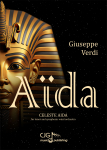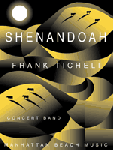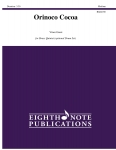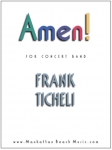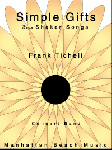Composer:
Schubert, Franz Arranger:
Ticheli, Frank Setting:
Concert Band
Genre:
Musica Sacra • Transcriptions Type of Product:
Full Score • Stimmensatz Publishing year:
2004 With the possible exception of Mozart, no other composer in the history of music ever surpassed Franz Schubert's genius for melodic writing. His lieder (art songs for voice and piano) were composed at an astonishing rate, and number in the hundreds. Some of Vienna's greatest singers were his closest friends, and he took pleasure in creating his songs for them. One of his most well-known songs, "Ave Maria," was composed in 1825 when he was 28 years old.
In my setting, I considered carefully the problem of translating piano music to the wind medium without compromising the dignity and beauty of the original. To have simply transferred the piano part literally to the winds would have resulted in a timid and thin sound. For me, the solution was to find and connect the multiple melodic layers implied by the piano figurations, creating a richer, more polyphonic texture suitable to the winds. I had lots of fun dissecting and re-assembling the piece, and I took occasional liberties in the process, but I never strayed far from the basic harmonic structure of the original, and I strove hard to preserve a Schubertian elegance and grace.
There are other differences between the two versions. In Schubert's setting, three verses of text are set to the same music. With the absence of the text in my version, it seemed sufficient to state the verse only twice, and it seemed necessary to find other ways to control and vary the dramatic flow. I took liberties with the octave placement of the melody, and rather than repeat the second verse literally, I constructed it as a subtle variation of the first. Finally, and perhaps most obviously, I changed the basic pulse of the original from the eighth-note to the quarter for greater ease on the eye.
Even without its text, Schubert's song sounds more devotional than virtually anything he ever composed. I kept this at the front of my mind throughout the creative process. Above all, I hope my setting reflects the profound sense of reverence and humility expressed in the original.
FRANK TICHELI
In my setting, I considered carefully the problem of translating piano music to the wind medium without compromising the dignity and beauty of the original. To have simply transferred the piano part literally to the winds would have resulted in a timid and thin sound. For me, the solution was to find and connect the multiple melodic layers implied by the piano figurations, creating a richer, more polyphonic texture suitable to the winds. I had lots of fun dissecting and re-assembling the piece, and I took occasional liberties in the process, but I never strayed far from the basic harmonic structure of the original, and I strove hard to preserve a Schubertian elegance and grace.
There are other differences between the two versions. In Schubert's setting, three verses of text are set to the same music. With the absence of the text in my version, it seemed sufficient to state the verse only twice, and it seemed necessary to find other ways to control and vary the dramatic flow. I took liberties with the octave placement of the melody, and rather than repeat the second verse literally, I constructed it as a subtle variation of the first. Finally, and perhaps most obviously, I changed the basic pulse of the original from the eighth-note to the quarter for greater ease on the eye.
Even without its text, Schubert's song sounds more devotional than virtually anything he ever composed. I kept this at the front of my mind throughout the creative process. Above all, I hope my setting reflects the profound sense of reverence and humility expressed in the original.
FRANK TICHELI
The following options can be choosen to configure this product:
PDF or Print Edition:
PDF
Print Edition +55,00 EUR
Print Edition +55,00 EUR
Customers who bought this product also bought the following products:
until instead of 19,95 €
Now only 15,96 €
you save 20% (3,99 €)
7 % VAT incl. excl. Shipping costs

